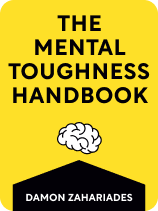

This article is an excerpt from the Shortform book guide to "The Mental Toughness Handbook" by Damon Zahariades. Shortform has the world's best summaries and analyses of books you should be reading.
Like this article? Sign up for a free trial here.
Do you want to stop engaging in negative self-talk and be more sure about your abilities? How can practicing mental toughness help?
In The Mental Toughness Handbook, author Damon Zahariades teaches readers how to be mentally tough and improve self-confidence through a variety of strategies and exercises. According to him, building self-confidence means becoming sure about your ability to handle difficult situations.
Read on to learn how to build your confidence, according to Zahariades’s advice.
How to Build Your Confidence
In The Mental Toughness Handbook, Damon Zahariades says that to be mentally tough, you have to be confident in your ability to navigate difficult situations. If you want to learn how to build your confidence, he says, you should challenge negative self-talk and practice validating yourself.
We’ll first define mental toughness, and then we’ll discuss Zahariades’s two strategies for improving self-confidence as well as his advice for confronting failure.
What Is Mental Toughness?
Zahariades defines mental toughness as strength and fortitude in the face of stress and obstacles. Mental toughness centers on your ability to effectively manage negative emotions like anger, fear, and sadness so they don’t control and lead you to make bad decisions. It also reflects your persistence and resilience in moments of hardship. Mental toughness isn’t something you’re born with, but a state of mind you can cultivate with patience, passion, and hard work.
Respond to Your Inner Critic
To improve your self-confidence, Zahariades’s first recommendation is to be aware of your inner critic. He says that we all have an inner critic that judges and tells us we’re doing things poorly. The critic’s goal (though misguided in its messaging) is to keep you safe from harm—a relic of evolutionary strategies aimed at managing risk by assuming the worst. When your inner critic bombards you with negative talk, like, “You’ll never make it!” “Everyone thinks you’re stupid!” and “You can’t do anything right!” respond to it with positive self-talk. This will help you to improve your self-confidence and prevent your inner critic from eroding your confidence in your ability to manage difficult situations and try new things, which can limit your progress.
(Shortform note: In How to Stop Worrying and Start Living, Dale Carnegie argues that you should be your own worst critic so you can: a) prevent others from beating you to the punch, and b) learn and grow from what’s not working. Recognizing and welcoming hard-to-hear criticism that comes from a well-intentioned place (which Zahariades says is what your inner critic is doing) will give you feedback that will help you become better and stronger.)
To do this: Be on the lookout for attacks from your inner critic. When they arise, address them immediately by showing yourself the same kindness you’d show a close friend who’s feeling down.
For example, if your inner critic says: “You can’t do anything right!” counter that negative message with: “That’s not true. Today I fed and walked my dog, worked so I can pay my bills, and called my grandmother to say ‘hi’, which made her feel special.” Being compassionate toward yourself will make you feel more confident, which will help you deal with difficult situations more effectively and increase your willingness to take risks, fortifying your mental toughness.
Validate Yourself
When you rely on others’ approval to feel confident and tell you what, when, and how to do things, Zahariades says you learn not to trust yourself and your capabilities. In contrast, when you validate yourself—by recognizing your unique talents, skills, and knowledge base—you will improve your self-confidence, learning to believe that you can navigate challenges and uncertainty more effectively.
To do this: To improve your self-confidence according to Zahariades’s method, list the biggest things you lack confidence about and steps you can take to diminish their impact on your self-assurance. For example, if you lack confidence in your ability to make decisions, commit to making at least one low-stakes decision each day to increase your confidence. This might be something as small as choosing a new salad dressing at the grocery store or reading a new book every other week to expand your knowledge base. Doing this repeatedly will build your confidence and positively reinforce your ability to make decisions.
(Shortform note: Mental health experts say that validating yourself comes with another benefit: It allows you to be your most authentic self, which helps you strengthen your identity and manage challenging emotions. They recommend two strategies to validate yourself: First, when you doubt yourself, reflect on your past successes to remind yourself of your capabilities. Second, focus on staying in the present moment so you can attune to your genuine needs, which will help you be true to yourself.)
Redefine Failure
Another important step in improving your self-confidence is learning to redefine failure. Zahariades says that when you change your perception of failure, you won’t feel like a victim of difficult situations. To be mentally tough, view failure as an inevitable part of life and valuable feedback that you can learn from—rather than something that’s bad or a reflection of your poor character or inadequacies.
When you’re open to learning from your mistakes, you’re telling yourself that it’s okay to not be perfect, and you have the capacity to grow, persist, and succeed. This will also help build your confidence. When you repeatedly approach setbacks with this mindset, you train your brain to see future challenges as opportunities to grow from, and you can make the best of challenging situations. Zahariades says this will leave you feeling inspired, not defeated, bolstering your ability to manage the situation and your mental toughness.
(Shortform note: Reframing failure is crucial to cultivating a growth mindset, which is based on the belief that you can always improve your abilities with hard work, persistence, and the right learning strategies. In Mindset, Carol Dweck provides a step-by-step guide to adopting a growth mindset instead of a fixed mindset (the belief that your personality and intelligence are innate and unchangeable). First, consider when and why your fixed mindset appears. Second, name your fixed mindset persona to remind yourself that that’s not who you want to be. Third, tell your fixed mindset that you won’t allow it to control you.)
To do this: When you make a mistake or fail, immediately acknowledge and dispute any negative thoughts that arise by telling yourself that this is a chance to learn and become better. Zahariades says this fosters a non-toxic headspace that will allow you to engage in the situation with a positive, creative mindset. Engaging in this process repeatedly will make it habitual.
(Shortform note: In Black Box Thinking, Matthew Syed offers a step-by-step process to learn from your mistakes. First, think about a habit you’d like to develop—for example, playing the piano for an hour each day—and begin that habit. Second, each time you finish playing the piano, reflect by journaling about the experience. Third, note any mistakes you noticed and your thoughts on where things fell apart: Maybe you realize you had a hard time concentrating because you had too many cups of coffee that morning. Finally, use that data to get a better outcome next time: The next morning, drink just one cup of coffee before you practice the piano.)

———End of Preview———
Like what you just read? Read the rest of the world's best book summary and analysis of Damon Zahariades's "The Mental Toughness Handbook" at Shortform.
Here's what you'll find in our full The Mental Toughness Handbook summary:
- A step-by-step guide to building mental fortitude and resilience
- How to reframe failures and setbacks as opportunities
- How to develop long-lasting habits to increase your mental toughness






